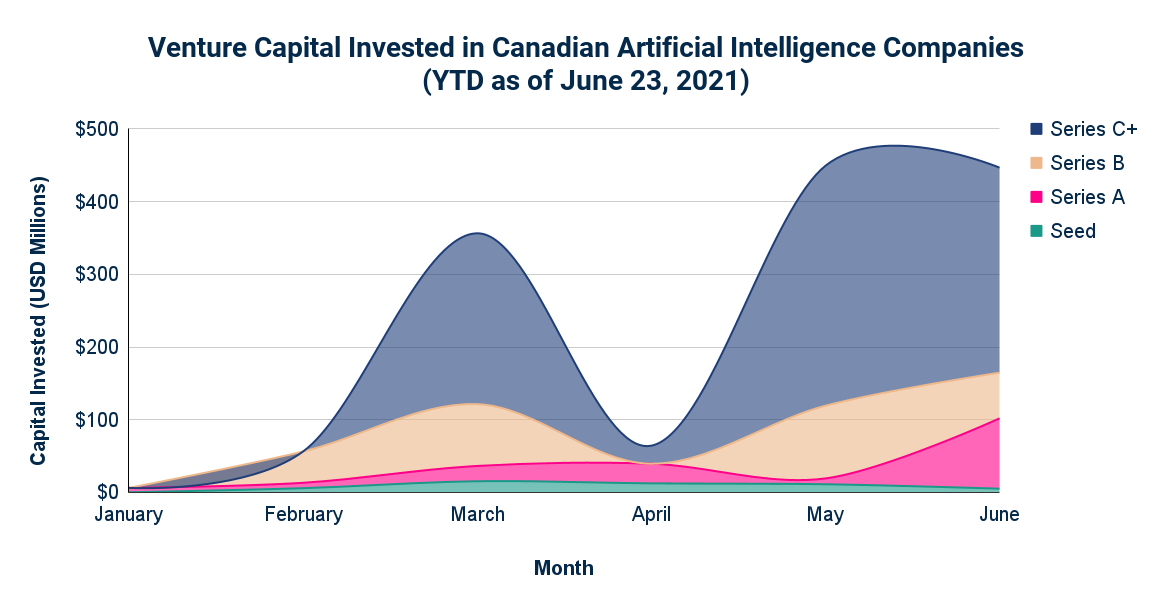The artificial intelligence market is estimated to reach $266 billion by 2027 (all figures in USD) and venture capital investment continues to follow the talent as Canada remains a central hub in global AI research.
In 2021, from January 1st to June 23rd there were 49 VC funding rounds for AI startups in Canada, raising a total of $1.38 billion. The total amount of capital raised is up 190% from the same period last year. Over half of these investments ($872 million) have been in late stage rounds (series C+), pointing to an interest from growth stage investors in deep tech companies with defensible AI technologies. Xanadu, a Radical Ventures portfolio company with a mission to build scalable quantum computers, raised $100 million in contributing to the total of $291 million raised in Canadian series B rounds this year.
Twelve series A companies jointly raised $166 million for some top-tier teams including Radical Ventures portfolio company, Waabi with what was one of the largest series A rounds ($83.5 million) ever raised by a Canadian company.
Finally, 26 seed companies raised $51 million. These companies are applying machine learning and AI technology to an expansive set of industries from agriculture to biomedicine, robots, and real estate. All of the aforementioned fundraises do not include at least ten startups in stealth and/or with unannounced rounds, including in Radical’s portfolio.
The teams creating and driving these companies will accelerate the momentum in the Canadian AI sector. As we have discussed frequently, Canada is a globally unique AI ecosystem built on the work of AI pioneers, a critical mass of talent, focused government policies and, more recently, smart capital.
AI News This Week
-
Could artificial intelligence stop 840 million people from going hungry by 2030? (EuroNews)
AI combined with nanotechnology could help farmers improve crop and soil production to address global food insecurity, according to a recent University of Birmingham study published in Nature. Researchers found that coupling existing models for nutrient cycling and crop productivity with nanoinformatics approaches can optimize targeting, uptake, delivery, nutrient capture and long-term impacts on soil microbial communities. This kind of precision agriculture, or advanced farming method, could significantly boost efficiency and crop yields.
-
WHO issues first global report on AI in health and six guiding principles for its design and use (World Health Organization)
Nations and organizations are increasingly publishing AI guidelines as part of a decades-long trend toward stronger social control of technology. The UN’s public health organization released a report outlining six principles for AI design and use. Most AI guide posts are not tailored to the technology itself or its application, however the WHO report aims to be highly specific in categorizing risks and applications for AI in healthcare. Similarly, NIST, a US federal agency, is working to put a number on a person’s trust in AI as a crucial indicator for AI adoption and a tool for managing both real and perceived risk.
-
Opinion | Trustworthy use of AI by governments starts with acknowledging unknowns (Toronto Star)
As realized by NYC’s algorithm task force, governments wanting to use AI to make decisions and provide effective oversight need to account for AI’s unknowns to ensure systems benefit the public. Vector Institute President and CEO Garth Gibson and Engineering Lead Ron Bodkin, alongside Schwartz Reisman Institute for Technology and Society Director Gillian Hadfield, discuss the need for “an agile, evidence-based framework, regular auditing based on multiple metrics, and private sector innovation.”
-
Technology in construction sector is slow to grow, new report says (Globe & Mail)
For years, digital adoption in construction has lagged compared to other industries. In a recent study, executives at nearly 60% of Canadian companies surveyed reported that their organizations “need to moderately or considerably” adapt their digital strategies. Ramtin Attar, CEO and co-founder of Radical Ventures portfolio company Promise Robotics, notes most are unsure about which technologies or applications can help them be more competitive, “you have to look at what can apply to an individual project compared with what will help a company and what works for the entire industry.” Promise Robotics is a platform for the robotic manufacturing of houses and building components. The company harnesses the scale and power of advanced robotics and AI to accelerate manufacturing times and to make home building more affordable and sustainable.
-
Slogans for the Class of 2030 by Douglas Coupland (Google Arts & Culture)
“We are here because we want technology to happen” – a slogan for the Class of 2030 generated using a language model tuned on Douglas Coupland’s extensive written work and social media posts he selected. The series addresses the global, “lightning-fast changes in what it means for any of us to be an individual” especially with rapid digital adoption.
Radical Reads is edited by Ebin Tomy (Analyst, Radical Ventures)

